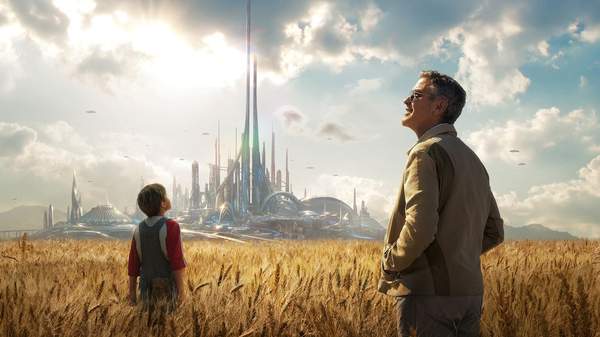Overview
Remember The Matrix Revolutions? It’s okay if you don’t. The final instalment of the Wachowskis’ groundbreaking trilogy possessed a litany of problems, chief among them being a Matrix film featuring little to no Matrix. It was like setting The Wizard of Oz entirely in Kansas, or Waterworld on land, or Policy Academy on a holiday in Miami (see: Police Academy 5: Assignment in Miami).
In the same vein, the most disappointing aspect of Tomorrowland is that it spends the lion’s share of its 107 minutes in Todayland. Under Australian consumer protection law, you might call that ‘misleading and deceptive conduct’. Under film law, you’d just call it a giant shame.
If the name ‘Tomorrowland’ sounds familiar, you’ve probably been to Disneyland. Like Pirates of the Caribbean, this is a movie based on a theme park attraction, and while that’s not quite the nadir of creative inception (Battleship surely holds that ignominy), it’s not much of an improvement either.
Theoretically, the land of tomorrow is a creative utopia; an alternate universe where all the dreamers — be they artists, inventors, musicians or scientists — can actually change the world free from the negative influences of politics and greed. If it sounds good, it looks even better: a sort of shiny retro future not unlike the one envisaged by The Jetsons. The question, of course, is how do you get there?
This forms the basis of much of the film. A young Frank Walker (George Clooney in his later years, Thomas Robinson as the child) attends the 1964 World’s Fair to pitch his homemade jet pack. The judge (a curmudgeonly Hugh Laurie) sends him packing, but his daughter Athena (newcomer Raffey Cassidy) takes a liking to Frank and sneaks him into Tomorrowland.
The story then jumps to the present day, where an apparently ageless Athena has turned her attention to the rebellious yet unfailingly optimistic Casey Newton (Britt Robertson). Athena slips Casey a magical pin that grants her a vision of Tomorrowland, fleeting in its duration yet enticing enough to send her on a quest to get there. Standing in her way are some spectacularly unexplained automaton villains and the gruff older Frank, who’s been exiled from Tomorrowland. There’s a sense Tomorrowland needs Casey, but nobody's prepared to say how or why.
On the production front, Tomorrowland boasts an impressive team: a Disney vehicle written by Damon Lindelof (Lost) and directed by Brad Bird (The Incredibles, Mission Impossible: Ghost Protocol). No surprise, then, that it looks spectacular and maintains a rollicking pace throughout, with the action sequences offering a terrific blend of thrills and imaginative visuals. The performances, too, are mostly strong, with two-thirds of the leading trio coming in the form of intelligent, capable and determined young women.
What lets Tomorrowland down is the heavy-handed messaging, repeatedly ramming its ‘we’re harming the planet’ line down our throats without a trace of subtlety, save for the one amusing Laurie gem: “We have simultaneous epidemics of obesity and famine. How does THAT happen!?"
Tomorrowland's other significant problem is the violence. The action sequences contain a surprising level of graphic savagery, including multiple beheadings, innocent bystanders frequently being vaporised and Casey at one point going full Pesci on an automaton with an old baseball bat. Coupled with the clumsy environmentalism, Tomorrowland finds itself too preachy for adults yet too confronting for children. All the ingredients are there for an excellent adventure, and it routinely offers moments of genuine brilliance, but the overall result is something less. The constant product placement, Disney branding and clear merchandising take their collective toll, crippling the Lindelof/Bird creative utopia with the very corporate influences it sought to denounce.
Features
Information
When
Thursday, May 28, 2015 - Wednesday, July 1, 2015
Thursday, May 28 - Wednesday, July 1, 2015
Where
Various cinemas in MelbournePrice
$15 – 25-
Event Type
